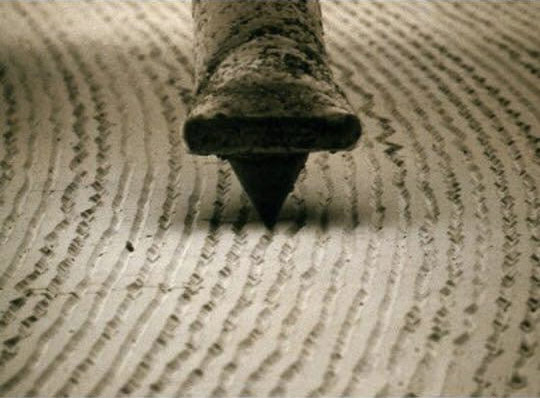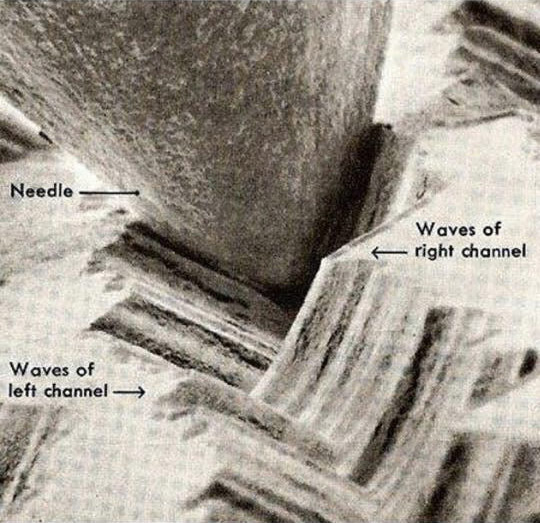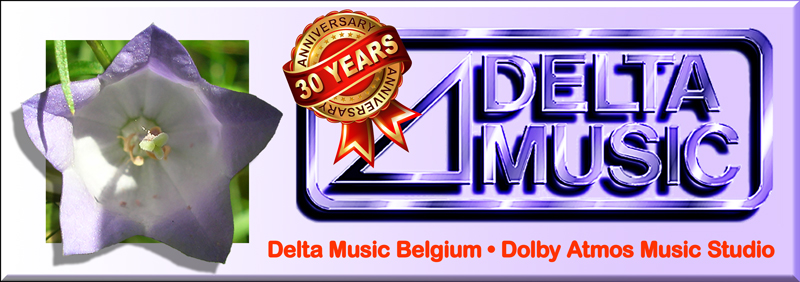Stereo mastering for CD, internet and vinyl
![]()
What is mastering?
![]()
There have been many books written about it, I will try to give a brief overview + some explanations on my choice to only master in the digital domain without analogue electronics.
Mastering is the final finish of a music production that had been mixed. It may involve one or more separate songs, or a set of songs that form a unity together, as on a full CD.
Is it a mastering of one or more separate songs, then usually this means that these songs are compared to other songs that are known to be reference songs and see to it that the mastered songs will sound as best as possible and are compliant to all objective technical demands and subjective artistic demands (not too soft or too loud, correct balance between bass and treble, intelligibility of vocals, audibility of all the musical instruments, etc...)
Is it a set of songs that form a unity together, the process is identical to the mastering of one or more songs, but with additional attention to the unity. The order of the songs will be determined and that order can influence the interrelationship of the songs, the volume of each song compared to the next one, mutual timbre, duration of silence in between songs, etc...
Practically: all the songs are loaded into Pro Tools | HDX, with or without some reference songs by other artists (the most frequently asked question when mastering is: can you make this sound like artist X or Y? ). Next, I listen very carefully to all the music and there where necessary, song by song, changes in volume, timbre and compression are applied. Sometimes it is not necessary to do anything, sometimes it is necessary to take more drastic measures or even to conclude that a song is not feasible to master and it would better to get the song remixed.
Once everything has been mastered the final sound files will be created, including the ISRC code for each song. Delta Music Belgium has joined SIMIM, the management company for the rights of music producers and can I can create en register ISRC codes if necessary.
I only master entirely in the digital domain with plugins in Pro Tools | HDX. There are people who prefer an analogue mastering with in some cases the use of rather esoteric analogue machines, but I know from experience that the technology of 'software modelling' is becoming so advanced that the sound and behaviour of even these rather esoteric analogue machines can be defined in a set of digital algorithms. And in double-blind listening tests a listener cannot hear the difference between a digital and an analogue plugin machine anymore. Moreover, this old analogue processing has drawbacks too (noise, shifting of the stereo image due to imprecise or worn out electronic components, signal degradation by to many DA/AD conversions, etc..). There are also tight boundaries inherent to analogue electronics, while digital algorithms can do things that by definition are impossible to achieve with analogue electronics (for example filter exactly one frequency without influencing adjacent or harmonic frequencies).
FYI: except for the technical specifications of CD mastering, mastering is not something you learn quickly. It takes years of experience + a very good knowledge of your studio. Because the most important aspect to know about your studio is how the sound that you hear in your studio translates to the outside world. And the longer I'm working with CD mastering, the more I am experiencing that you eventually literally get the 'right sound' in your ears. In other words, you will hear very quickly whether something is right and sounds good or not, even without reference CDs + you know what you need to do to get that sound. And that can be as precious as gold...
![]()
Mastering for CD and/or especially for internet?
![]()
Is there a difference between mastering for CD mastering and for internet? The answer is unequivocally yes.
Foremost there is a clear difference in the medium itself: CD is the complete digital audio data as it originally was in the studio after mastering, a web file is a compressed version of that same data, for example AAC / m4a (iTunes) or MP . This difference manifests itself most clearly in the size of the data file: a compressed version for internet is 10 times smaller than the original CD data. While it is argued that both compression to AAC / m4a (iTunes) as to MP3 displays no difference in audio quality, but anyone who ever listened seriously to the difference between CD and MP3 knows that this is not true.
During the mastering it is possible to listen to the versions in AAC / m4a (iTunes) and MP3 immediately and adjust the mastering accordingly. This can be done in real time, with a click of the mouse you listen to the CD version, AAC / m4a (iTunes) Version or one or more versions of the many MP3 formats
![]()
Mastering voor vinyl
![]()
To get straight to the point: I am absolutely not a fan of vinyl records. I don't understand why people prefer the sound of a needle bouncing through a groove (because that's literally what happens) over the accurate reproduction of a digital sound file every time.
This is a close-up of a needle in the groove on an LP under an electron microscope:

And much more zoomed in on the tip of the needle:

An LP uses very outdated technology that has been on the market since 1948 and was at its peak in the 60s and 70s. The sound quality is determined by a lot of external factors, an LP has to do with, among other things, wow, flutter, hum, resonance, distortion, vibrations, the quality of the needle and the weight of the arm. Also, not every LP is identical to each other because the quality of different pressings can also vary. And vinyl also creaks due to built-up static electricity during playback + every time you play a vinyl record it wears out a little (and this also applies to the needle used), so over time the sound quality only gets worse and worse.
This compared to digital sound files that generate the same data streams over and over again, bit by bit, without wow, flutter, hum, resonance, distortion and vibrations + cracking due to built-up static electricity, nor do they wear out. For me the choice was made very quickly...
FYI: the 'warm' sound that one experiences with vinyl is caused by distortion that is not present when playing digital sound files. So if you aim for the most correct possible representation of the original recording, vinyl should always be inferior to digital files as no distortion takes place there. So it's not digital that sounds too cold, it's vinyl that sounds 'too warm' compared to the original sound recordings.
In any case, 99% of all vinyl records released over the last 15 to 20 years started with the digital 24 bit - 96 kHz master sound file that is also used for CD mastering and internet mastering. So in that respect there is no difference between digital and vinyl because the source is exactly the same.
Specific mastering for vinyl in a mastering studio is therefore not necessary at all, because the adjustments required for vinyl are made prior to engraving the 'Laquer' (or the copper plate with Direct Metal Mastering) in the vinyl record pressing plant. Among other things, the necessary filtering is carried out (RIAA conversion), usually (but not always) all sound below 100 Hz is made mono and sometimes some extra compression is also applied because the dynamic range of a vinyl record is much smaller than that of a digital file. It is therefore best to leave 'mastering for vinyl' to the person who operates the engraving machine in the vinyl record pressing plant.
![]()
Mastering in the studio attended by the client or online mastering service
![]()
In the past, it was a standard procedure for the artist and/or producer
to attend the mastering in the studio. This has the great advantage that
the client can see and hear what is happening and to some extent can influence
the final result. And certainly in the case a song is not feasible to master
and it would better to get the song remixed the presence of the client
can be a plus because the client can hear where the problem is. I still
prefer this procedure,
a direct contact with the client
is usually only positive.
In recent years the trend has arisen to just supply the music files online and to not to attend the mastering in the studio. Delta Music Belgium also offers this possibility.
For supplying and delivering the sound files I work with Dropbox. When there is a PMCD package required for the CD-pressing plant, it will be delivered by post.
FYI: a mastering for CD and the internet must be paid for in advance, but there is no restriction in studio time. I master and remaster without surcharge until the client is satisfied. Before the payment I always want to listen to music to determine whether the music is feasible to master or should be remixed
![]()
Technical info
![]()
We can master for carriers and/or digital formats listed below:





All supplied files are converted to 24 bit - 96 kHz (= HD quality) and then mastered. Was this the original format in which the music was mixed, provide these files if possible. Was it mixed at a lower quality, but in 24 bit, you must definitely provide 24 bit files. Are only 16 bit files available, they can be used to master, because this is still CD quality. If you only have AAC / m4a (iTunes) or MP3 file, these can be tested to determine if the sound quality is good enough to master.
Once mastered these stereo files will be made and delivered online and/or on a USB stick:
- BWAV - STEREO - 24 bit - 96 kHz (= HD quality)
- BWAV - STEREO - 16 bit - 44.1 kHz (= CD quality)
- AAC / m4a (iTunes)
- MP3
For an extra charge, a DDP package or PMCD package can be made for the CD pressing plant, this package includes:
- USB stick with the DDP file or a PMCD for the CD pressing plant (with printed PQ list and ISRC coding)
- USB stick with the DDP file or a PMCD Safety Clone for self-archiving
- a copy to listen to on USB stick or CD-R
A DDP file can also easily be delivered to the CD pressing plant via the internet
![]()
Which genres of music can be mastered?
![]()
Basically all genres of music are welcome, but of course I have my preferences and specialties + I take the liberty to choose what work I agree to do.
More information on this can be found can be found in the answer to question 4 on the page
![]()
![]()
Copyright © 1995-2025 by Delta Music Belgium • Dolby Atmos Music Studio • Rummenweg 30 • 3800 Sint-Truiden • Belgium
All Rights Reserved
Privacy notification and cookie policy
All product names, logos, and brands are property of their respective owners.
All company, product and service names used on this website are for identification purposes only.
Use of these names, logos, and brands does not imply endorsement.
![]()
